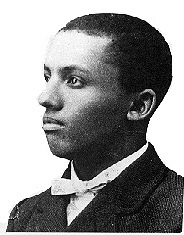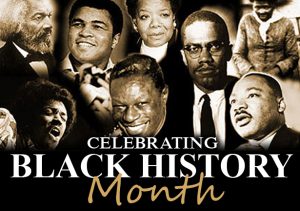If a race has no history, it has no worthwhile tradition, it becomes a negligible factor in the thought of the world, and it stands in danger of being exterminated. The American Indian left no continuous record. He did not appreciate the value of tradition; and where is he today? The Hebrew keenly appreciated the value of tradition, as is attested by the Bible itself. In spite of worldwide persecution, therefore, he is a great factor in our civilization.

Carter G. Woodson
Who said that? Carter G. Woodson, an African-American historian, and he said it back in 1926, as a justification for “Negro History Week.” Woodson proposed setting aside one week every year for this focus, not only in “colored” schools but all schools. His main concern was that his people were mostly being presented in schools as slaves or (in Great Britain) colonial subjects—but history had marched on from slavery and the race had produced outstanding leaders and citizens.
The week he chose was the second week in February to coincide with the birthdays of Abraham Lincoln (the 12th) and Frederick Douglass (the 14th). His proposal did not meet with an enthusiastic response, even though Departments of Education in North Carolina, West Virginia, and Delaware were open to it, as well as school administrators in Baltimore and D. C. Woodson was nonetheless encouraged, and within a few years Negro History Week was getting favorable publicity from black and mainstream newspapers, churches, and progressive political organizations.
In 1976, while the nation was celebrating its bicentennial, the week was stretched to a month and given federal sanction, which is why February is officially Black History Month.
 Do we need it? This question always comes up, along with Why not a white history month? and “Why can’t ‘Black History;’ just be incorporated into American history?” To many Americans, designating a month to the people of a particular group smacks of political correctness—and sure enough (naysayers say), every other aggrieved group has to follow along: Hispanic Heritage Month (Sept. 15-Oct. 15), Women’s History Month (March), LBGT Pride Month (June).
Do we need it? This question always comes up, along with Why not a white history month? and “Why can’t ‘Black History;’ just be incorporated into American history?” To many Americans, designating a month to the people of a particular group smacks of political correctness—and sure enough (naysayers say), every other aggrieved group has to follow along: Hispanic Heritage Month (Sept. 15-Oct. 15), Women’s History Month (March), LBGT Pride Month (June).
But there’s more at work than PC. Black history really is unlike any other, and it has grown in importance since the creation of Negro History Week. African Americans have a unique heritage, to say the least—the only Americans to have come here (at the beginning) involuntarily, and the only ones who did not assimilate in the same way and same length of time. Some claim they were never assimilated, and remain outsiders to this day.
There’s a lot of truth in what they say. In Tears We Cannot Stop, scholar and writer Michael Eric Dyson writes,
We [blacks and whites] are two historical forces meeting, and the velocity of that history is so strong it can break the bonds of individual love. We are no longer two people asking each other to be understood. Instead, we are two symbols in a 400-year-old battle of guilt and innocence.
James Baldwin sounded the same themes in the 1940s and 50s, as did Ta-Nehisi Coates in his 2014 runaway best-seller, Between the World and Me. To them, history is everything: faith, creed, justification. Too much? I think so, but this is where many black thinkers and writers are, and we can at least try to meet them there. Not in a condescending way, but in a fellow-human-being way.
Fortunately for us at Redeemed Reader, we’ve got some outstanding titles to review this month! Freedom over Me, which imagines the backgrounds and dreams of 11 historical figures (taken from the property register of a Virginia plantation) is a Newbery honor book this year. Even better (in my opinion) is Answering the Cry for Freedom, a nonfiction biography of thirteen exceptional men and women who achieved much against great odds. You Can Fly is a tribute in verse to the Tuskeegee airmen and Step Right Up introduces young readers to “Doc” Key and his amazing horse Jim. Finally, did you know there’s a young-reader edition of Hidden Figures, the book that inspired the hit movie?
One complaint about Black History Month, and black history in general, is that it can slide too easily into grievance and resentment. With justification. But can a people be enslaved by their history? Too mired in sorrow and anger—justified though they may be—to go forward into something better? Carter Woodson might say so; he didn’t want “Negro history” to be just about slavery. Sad as race relations continue to this day, there’s a way forward—and one good book we can heartily recommend to show the way. We’ll review that one on Friday—be here!
Support our writers and help keep Redeemed Reader ad-free by joining the Redeemed Reader Fellowship.
Stay Up to Date!
Get the information you need to make wise choices about books for your children and teens.
Our weekly newsletter includes our latest reviews, related links from around the web, a featured book list, book trivia, and more. We never sell your information. You may unsubscribe at any time.
We'd love to hear from you!
Our comments are now limited to our members (both Silver and Golden Key). Members, you just need to log in with your normal log-in credentials!
Not a member yet? You can join the Silver Key ($2.99/month) for a free 2-week trial. Cancel at any time. Find out more about membership here.
4 Comments
Leave a Comment
You must be logged in to post a comment.


I would like to get beyond Black History Month and develop a curriculum that includes Black History and literature.
I am working with the history curriculum theme at our Christian School. I am researching books to supplement our curriculum. I am also pushing for more multicultural literature in our classroom libraries.
I understand why Black History Month exists but we are working towards integrating books in our curriculum all year long.
That sounds like a great approach, Lou. Literature is the best way to get to the heart of a culture and people.
This is an amazing reflection, Janie —one perfectly positioned to be “shot at from both sides” for being not conservative enough for the traditionalist nor progressive enough to suit the contemporary sensibilities of others.
This is precisely the difficult ground my husband and I have tried to hold for 25 plus years working in the field of Christian economic development in the context of the African American community.
Alison, Thanks for your perspective! I regret that I don’t have close contact with the community, due to circumstances not inclination. I fear too many black thinkers, like Dyson, Coates, and Kendi, are defining themselves almost exclusively by their relationship to whites–hence the tight focus on continuing oppression. I’d love to see more about aspiration and accomplishment.